I like Stephen Dixon a lot
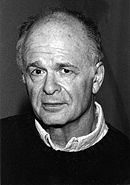 Stephen Dixon’s stories, like Beckett’s, flourish despite — or perhaps because of — their constraints. There’s probably a better way to talk about it, but I think of it as ‘dense minimalism,’ wherein scarcity is conveyed through excessive means in writing. I’ve been very interested in Dixon ’s methods and with this post I will try to investigate him formally. To do this, I will use three fairly random (of course, I had to find something to get the point across, but the search was pretty casual) excerpts from 30: Pieces of a novel. My goal is to convey how constructed his narrative space is. The blockquotes are sentences from 30: Pieces of a novel.
Stephen Dixon’s stories, like Beckett’s, flourish despite — or perhaps because of — their constraints. There’s probably a better way to talk about it, but I think of it as ‘dense minimalism,’ wherein scarcity is conveyed through excessive means in writing. I’ve been very interested in Dixon ’s methods and with this post I will try to investigate him formally. To do this, I will use three fairly random (of course, I had to find something to get the point across, but the search was pretty casual) excerpts from 30: Pieces of a novel. My goal is to convey how constructed his narrative space is. The blockquotes are sentences from 30: Pieces of a novel.
I like existentialism a lot
 I think when people talk about existentialism, they are talking about one of two things: the actual philosophy, and—more generically—books that ‘feel’ and are labeled as being existentialist.
I think when people talk about existentialism, they are talking about one of two things: the actual philosophy, and—more generically—books that ‘feel’ and are labeled as being existentialist.
Existentialism, since like Jr. year in highschool, has always been ‘cool,’ like the Smiths or the Cure, for smart and depressed people. I’m not saying I was or am smart or depressed, just that certain books made me feel less lonely, which is weird because those books and authors seemed really lonely. I guess it’s the whole ‘read to know you’re not alone thing.’
Academic existentialism is dry, difficult to understand, and makes me feel more lonely. I tried reading Being and Time, and Being and Nothingness by Heidegger [see Pink’s] and Sartre, respectively, but it was sort of like math. Every time they said a sentence, they tried to prove it using other sentences which they then had to prove. I lost track of what they were arguing (at me) about. It’s like arguing with a girlfriend, without the boobs. Most philosophy is this way: noble and boring.
The existentialism I like are the books that people call existentialism. I will name them and talk about them briefly after the break.
I like Miyazawa Kenji a lot.
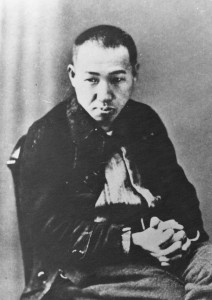 Miyazawa Kenji began existence in 1896 and stopped existing in 1933. He wrote chldren’s stories and poetry. I am not going to elaborate why I like him or why I think you should read him.
Miyazawa Kenji began existence in 1896 and stopped existing in 1933. He wrote chldren’s stories and poetry. I am not going to elaborate why I like him or why I think you should read him.
This is a favorite poem from Miyazawa:
Strong in the Wind
Strong in the rain
Strong in the wind
Strong against the summer heat and snow
He is healthy and robust
Unselfish
He never loses his temper
Nor the quiet smile on his lips
He eats four go of unpolished rice
Miso and a few vegetables a day
He does not consider himself
In whatever occurs…his understanding
Comes from observation and experience
And he never loses sight of things
He lives in a little thatched-roof hut
In a field in the shadows of a pine tree grove
If there is a sick child in the east
He goes there to nurse the child
If there’s a tired mother in the west
He goes to her and carries her sheaves
If someone is near death in the south
He goes and says, “Don’t be afraid”
If there’s strife and lawsuits in the north
He demands that the people put an end to their pettiness
He weeps at the time of drought
He plods about at a loss during the cold summer
Everyone calls him “Blockhead”
No one sings his praises
Or takes him to heart…That is the sort of person
I want to be
I like Eddie Bunker a lot.
 I imagine Eddie Bunker slow smoking a cigarette while blank staring out a dirty window in a dirty motel room in a dirty city called LA. Eddie feels fear and outspoken rage towards normal society because they refuse to accept him as a valid human being. Eddie understands the concept of urban survival and has made a cognizant decision to become the predator and not the prey. A stolen hand gun sits on his left and a typewriter sits on his right. Today Eddie chooses the typewriter.
I imagine Eddie Bunker slow smoking a cigarette while blank staring out a dirty window in a dirty motel room in a dirty city called LA. Eddie feels fear and outspoken rage towards normal society because they refuse to accept him as a valid human being. Eddie understands the concept of urban survival and has made a cognizant decision to become the predator and not the prey. A stolen hand gun sits on his left and a typewriter sits on his right. Today Eddie chooses the typewriter.
***
I like Edward ‘Eddie” Bunker a lot. His prose isn’t anything particular and you won’t find University professors discussing his work to bubblegum eyed freshman. The work is still enjoyable.
He spent the first half of his life surviving mean streets and concrete cages, evading the law (including being on the FBI’s Most Wanted list), and writing from his prison cell.
Urban survival in LA taught him to be predatory, violent and apathetic towards fellow humans. Acclimation to his harsh reality resulted in rejection from society. Overwhelming feelings of alienation and rage followed. These concepts are static in his writing.
If I had to choose one of his books to recommend, I would suggest “No Beast So Fierce”. “Animal Factory” being second.
Any young person with MTV glossed images of LA dancing in their soft little heads should read Eddie’s work. Greater people have broke themselves against this city’s teeth.
You aren’t very special. You won’t make it out alive.
i really super-like MARTIN HEIDEGGER a lot
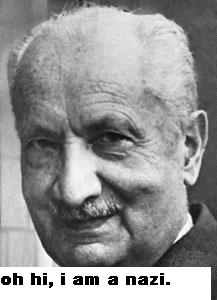 the book BEING AND TIME (SEIN UND ZEIT) is the most important book i have read. i feel confident saying that because i have thought “this is the most important book i have read” numerous times in the past and it keeps happening. i am pleased even when i just pass by the book in my room, and look at it. it is the only book of philosophy, along with the TRACTATUS, that i felt an immediate change in my life, not just like, “i am somewhat impressed by this” but a condition in which i keep thinking about the application of the book to basically everything that happens to me. when i think about the chapter that discusses something called the THEY-SELF, i feel terrified. sometimes i just look at the name MARTIN HEIDEGGER and start singing the theme song from MARTIN (the television show with MARTIN LAWRENCE), but i picture MARTIN HEIDEGGER walking into a room with a laughing audience.
the book BEING AND TIME (SEIN UND ZEIT) is the most important book i have read. i feel confident saying that because i have thought “this is the most important book i have read” numerous times in the past and it keeps happening. i am pleased even when i just pass by the book in my room, and look at it. it is the only book of philosophy, along with the TRACTATUS, that i felt an immediate change in my life, not just like, “i am somewhat impressed by this” but a condition in which i keep thinking about the application of the book to basically everything that happens to me. when i think about the chapter that discusses something called the THEY-SELF, i feel terrified. sometimes i just look at the name MARTIN HEIDEGGER and start singing the theme song from MARTIN (the television show with MARTIN LAWRENCE), but i picture MARTIN HEIDEGGER walking into a room with a laughing audience.
I like Rick Moody a lot, wanna fight?
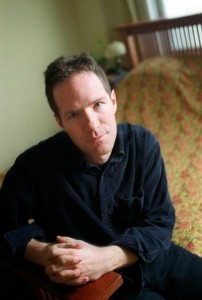 Rick Moody, along with David Foster Wallace, was one of the big reasons I started writing fiction. The first book of his that I read was ‘Purple America.’ The opening pages of ‘Purple America’ are a man describing his mother’s failing body and the methods he employs to care for it in mostly one long run on sentence, post-Ginsberg ‘Kaddish’ style, and it is among the most beautiful openings of a book I can remember. This is an excerpt of the sentence:
Rick Moody, along with David Foster Wallace, was one of the big reasons I started writing fiction. The first book of his that I read was ‘Purple America.’ The opening pages of ‘Purple America’ are a man describing his mother’s failing body and the methods he employs to care for it in mostly one long run on sentence, post-Ginsberg ‘Kaddish’ style, and it is among the most beautiful openings of a book I can remember. This is an excerpt of the sentence:
“whosoever slips his mother’s panties up her legs and checks the dainty hairless passage into her vulva one more time, because he can’t resist the opportunity here for knowledge, whosoever gags briefly at his own forwardness, whosoever straps his mother’s bra onto her, though the value of a bra for her is negligible, whosoever slips a housedress over her head, getting first one arm and then the other tangled in the neck hole,”
etc etc. I realize more and more looking back how much I learned from Moody’s poetic listmaking devices and explorative thinking set in prose in the same way that I learned from DFW, but differently. Moody is a different beast, more florid in a certain way and more in a poetic mode, but the way he constructs these monsters of increasing awareness and tenor, I don’t know, they definitely have been important to me.
i 1/2 like CAMUS a lot
i have read THE FALL and THE MYTH OF SISYPHUS and i liked THE FALL but not THE MYTH OF SISYPHUS. THE FALL makes me uncomfortable to read. i like it when i feel uncomfortable. when reading THE FALL, i often think things like, “if this person were real, i would be annoyed but probably not say anything because i wouldn’t know what to say and i would just sit there and listen, like i am doing with this book.” THE FALL does that “here is a really thinly disguised book of philosophy outlined in a social situation” thing but i didn’t feel aggravation or even like i should accidentally spill something on it so i would not have to read it anymore. i did not enjoy reading THE MYTH OF SISYPHUS but i will not say anything else because if Camus finds out he will blog in a mean way about me and htmlgiant will fire me and spit on me all at once (that’s how htmlgiant fires people at meetings, a group spitting). in conclusion, Camus = 1/2 awesome.
I like Russell Edson A Lot
 Russell Edson is really old. He was born in 1935. I like a lot of things about Russell Edson but one thing his writing is not, is old. His stuff is always really fresh and modern, full of sadness and amazing images. Sometimes you read writers who really inspire you to write. When I read Russell Edson I don’t feel like writing because he’s already done it.
Russell Edson is really old. He was born in 1935. I like a lot of things about Russell Edson but one thing his writing is not, is old. His stuff is always really fresh and modern, full of sadness and amazing images. Sometimes you read writers who really inspire you to write. When I read Russell Edson I don’t feel like writing because he’s already done it.
Russell Edson is having fun when he writes. In an interview he said, “I have no formal background, as you suggest, in anything. I just make up things as I go along without a program. It’s more fun that way.”
What I like is that his writing is really strange, but branching off the strangness is dozens of feelings. I think strange writing or surreal writing has to be done well. I read lots of stuff that is strange, but that’s all it is. It’s just fucked up with no where to go.
I really like this poem by Russell Edson. Every time I read it I love it more. I want to live in this poem. I want to meet the Closet-Man. I can feel and taste this poem and it’s dreamy and mysterious and it’s a shape and it’s wonderful.
THE REASON WHY THE
CLOSET-MAN IS NEVER SADThis is the house of the closet-man. There are no rooms, just hallways and closets.
Things happen in rooms. He does not like things to happen.
… Closets, you take things out of closets, you put things into closets, and nothing happens…
Why do you have such a strange house?
I am the closet-man, I am either going or coming, and I am never sad.
But why do you have such a strange house?
I am never sad…
I like Haruki Murakami a lot
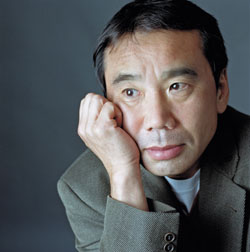
First off, I do think Murakami is over-rated, but that doesn’t mean he’s not good. I only like two of his books, but I like them immensely: Wind-up bird Chronicle and Kafka on the Shore. His ideas are sometimes corny, but overall I think he’s onto something.
His other books, especially the ones like Norwegian Wood where he goes on about Jazz and girls, I think is stupid—like he’s trying to be F. Scott Fitzgerald, sentimental or even self-satisfied about his lifestyle.
I much more like it when Murakami tries to be Pynchon or Borges. I say ‘tries to be’ because I think Murakami is not original, but he takes existing ideas or methods about/in fiction and his mark is his ability to make it seem like he invented the style. At the same time, he’s not trying to be post-modern the way Delillo tries, or Barth tried. His style is re-appropriation and the audacity to not be ironic about it. He’s an ‘earnest original fraud,’ and I like him a lot.
WUBC starts off with a guy making spaghetti and listening to the radio when the phone rings. I’ve read that part over many, many times and I don’t understand how he did it, but that scene is just as grotesque as Gregor Samsa waking up as a bug. It’s like there’s something ‘wrong’ with the scene. Murakami’s genius is his ability to evoke feelings that are completely uncorrelated with the actual printed words. His novels ‘happen’ outside the words.
KOTS uses alternating chapters to describe two narratives, which is gimmicky I know, but he handles it very well. Near the middle of the book I said, “wait a minute — this is the same story, merely synopated,” that the odd chapters somehow melded into the chasms introduced in the even chapters. It was like entropy: a closed system with two parts, each of which began permeating into the other. I’m usually skeptical about the device of ‘dreams’ in fiction, but KOTS was itself a dream — like the logic was not rational yet made sense, the way we accept random images in our dreams. It lacks Gaddis’s intricacy, but is yet is formally resolved. Murakami, at his best, transcends the formal constraints of time, lineage, narrative, character, etc. His books are dreams that make sense, while not relying on ‘dreams’ to resolve the formal disparities. I can’t describe how he does it, it’s just Murakami.
Whenever I want to be confused and feel like there are Japanese people everywhere, I either go to Japantown or read Murakami. I like him a lot.
i like SOREN KIERKEGAARD a whole bunch
soren kierkegaard was a philosopher in the eighteen hundreds who didn’t think he was a philosopher. i read “the sickness unto death” “either/or” “philosophical fragments” “the concept of dread” “fear and trembling” “repetition” “concluding unscientific postscript” “the attack on christendom” and “the modern age.” i think my favorite of his books is “the sickness unto death.” i have read it probably eight times and every time i read it i still pause in between every few pages and do like, a little air guitar solo thing that represents how much i like what i am reading. one time i was on a train to new york and i was reading it and a man who called himself “the gay rabbi” came up to me and started hitting on me. he called me a skinhead when i ignored him and then he started hitting on this goth kid in the next seat and the goth kid kept threatening to “beat the shit” out of the gay rabbi. the only things i vividly remember from that trip were “the sickness unto death” and the scab on the end of the gay rabbi’s nose. i think that along with “beyond good and evil” and “being and time,” “the sickness unto death” is the most important, concretely applicable book of philosophy i have read. my favorite smaller piece of writing from soren kierkegaard is called “what says the fireman?” if kierkegaard were alive today, i feel that he would be the character in a frat movie that is smart and for some reason helps out a group of kids that are considered rejects but then he would become terrified at how much he is failing as a christian.
